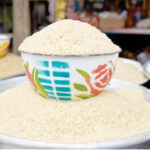Mr. Ade Adefeko is the Vice President, Corporate & Government Relations of Olam Group. In this interview, he speaks on the efforts of the company to support the government’s rice sustenance drive among other burning issues in the rice value chain.
Your company is one of the big players in the nation’s rice hub, can you share your contributions to the rice development effort in the country so far?
- #EndSARS: Oluwo Seeks Inclusion Of Traditional Rulers In Panel Of Inquiry
- We’re Reinventing Northern Nigeria’s Rich Heritage- Director, Arewa House
Olam developed a fully irrigated 13,500 hectare of paddy rice farm at Ondorie in Doma Local Government Area (LGA) of Nasarawa State in 2011 for cultivation twice a year. Also, at the heart of the farm is a fully mechanised milling facility within annual production capacity of 120,000 metric tonnes of paddy. The farm has also produced the most popular brands of Nigerian rice over the last years. Brands like Mama’s Pride, Mama Royale and Mama’s Choice are household names in Nigeria. In addition, we have another tolling facility in Kano with capacity for 120,000 metric tonnes; bringing a total milling capacity to 240,000 metric tonnes, thereby making us unarguably the largest rice farm and mill in the country.
Olam’s Rice Outgrower programme for external farmers has been in operation for the last 15 years and has now grown in strength to involve over 40,000 small holder farmers across the states of Nasarawa, Benue, Plateau, Taraba, Niger, Kebbi and Jigawa. We provide farm inputs (especially certified seeds and appropriate fertiliser) to the farmers and give them training on world class farming practices which go a long way in ensuring the best possible quality and yield.
Olam has provided local communities with school buildings, materials and scholarships and connected communities through development of 54km of roads between surrounding villages while also ensuring access to clean water and electricity through boreholes and solar lamps.
Your mill is sitting on a vast land in Nassarawa State, in what ways do you think local farmers are being assisted to further boost their production capacity?
Olam’s Rice Outgrower programme for farmers has been in operation for the last 15 years and has now grown in strength to involve over 40,000 small holder farmers, with a plan for expanding the number.
What do you think government and stakeholders can do to sustain the current tempo in local rice production?
The fact that there are exciting returns on cultivating a hectare of paddy will encourage more youths to take up rice farming as a serious and sustainable profession. Today, throughout the North and the Middle Belt, rice is the favourite crop and it supports livelihoods of over two million farmers in the country. Government needs to provide support with good road infrastructure, proper irrigation facilities, access to quality and affordable seeds and adequate drying facilities.
Annual flooding destroys crops of thousands of farmers and only government support can provide them with the much needed security for returning to their farms again.
Do you think it is time for re-opening borders as is being muted in some quarters?
The land borders of Nigeria have historically been porous, thus rice flows freely into the country across our South West, North and South East borders. Approximately, 2,000,000 metric tonnes got into the country across various land borders every year up until 2019. The smugglers have come up with newer and more innovative routes (sometimes even waterways). Small vehicles like cars and motor bikes are very popular modes of smuggling rice across the borders.
Towards the end of 2019, we witnessed the decision of blanket border closure by the FG which was welcomed heavily by rice farmers and millers. This steady policy has led to a significant jump in paddy cultivation in Nigeria. Jobs are being created in the farming communities in the remotest parts of the country at an unprecedented rate. Livelihoods are being transformed due to the policy stability of the FG over the last one year. Official opening of land borders will have disastrous effect on all the progress made in the rice industry so far. Apart from the strict border control policies, the solution lies in the economic policy of making Nigerian paddy and finished rice prices cheaper and passing on a strong message of advocating Nigerian rice to all consumers consistently through the mass media.
Smuggling probably can’t be completely removed, but it can be drastically reduced if these two-pronged approach is implemented with zeal.

 Join Daily Trust WhatsApp Community For Quick Access To News and Happenings Around You.
Join Daily Trust WhatsApp Community For Quick Access To News and Happenings Around You.


